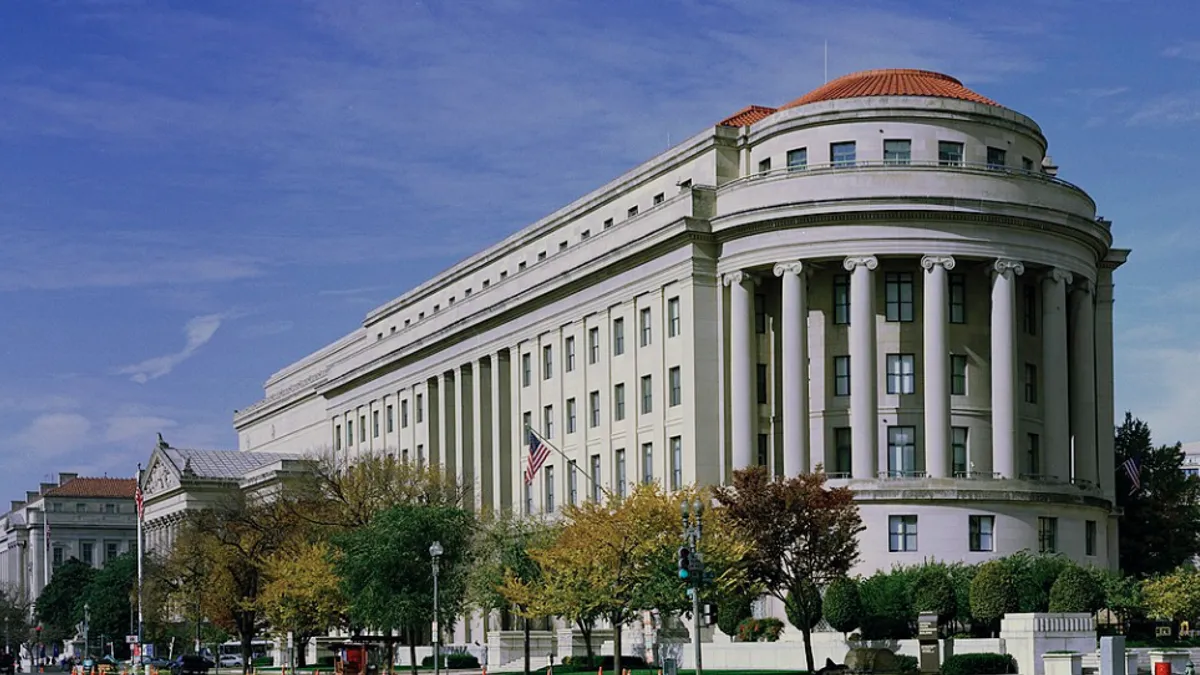In an aggressive response to the Federal Trade Commission’s lawsuit last month over fraudulent money transfers, Walmart vowed to fight the federal agency and sought to reassure customers about the benefits of its services.
The nation’s largest retailer laid out a lengthy rebuttal to the FTC’s case in several online posts, pointing to the agency’s failure to acknowledge its own governmental finding in 2018 that Walmart’s money transfer partner MoneyGram International operated a faulty fraud-blocking system. Much of the retailer’s response revolved around shifting the focus to that partner.
“The FTC’s decision to pursue Walmart raises serious questions, including about the government’s own conduct,” Walmart said in a June 28 online response to the government’s case. “We want to know how MoneyGram’s colossal interdiction system failure could have happened — for 18 months — while MoneyGram was supposed to be under government supervision.”
Sharing the blame
In a 2018 settlement with the FTC, MoneyGram agreed to pay $125 million for failing, under terms of a 2009 Federal Trade Commission order, to take action against fraudulent money transfers that siphoned millions of dollars from U.S. consumers, the government said. Now, Walmart is recalling that action in its defense.
“Claiming an unprecedented expansion of the FTC’s authority, the agency seeks to blame Walmart for fraud that the agency already attributed to another company while that company was under the federal government’s direct supervision,” Walmart said in another June 28 statement.
Walmart is so adamant about sharing the blame with MoneyGram that it filed a Freedom of Information Act request with FTC’s FOIA office just weeks before the FTC announced its June 28 lawsuit against the retailer, seeking information about a “long-running matter involving Walmart and money transfers,” according to that June 3 letter released by Walmart. Specifically, the retailer is seeking documents related to the MoneyGram system failure and any communications about it.
The FOIA letter was written by Sean Berkowitz, a former federal prosecutor now at the law firm Latham & Watkins who is representing Walmart in the litigation.
For its part, MoneyGram is deflecting that renewed focus on its past. In response to Walmart’s response to the FTC lawsuit, MoneyGram said this in a Wednesday statement:
“MoneyGram has worked closely with Walmart on anti-fraud efforts to protect consumers. In 2018, for example, MoneyGram became the only money transmitter in the industry to require consumer identification at the point of sale for every transaction, and worked closely with Walmart to implement the policy. In the Walmart lawsuit, the FTC positively cited that Walmart implemented this practice as a direct result of MoneyGram’s initiative.”
Walmart’s fraud defenses
Indeed, Walmart countered the FTC’s allegations by saying that “only a miniscule number of transactions” are alleged to be fraudulent and that it has “stopped hundreds of thousands of suspicious transactions totaling hundreds of millions of dollars.”
Beyond that, Walmart asserted that it has actually saved consumers significant sums on money transfers. The retailer began offering money transfer services by partnering as an agent with MoneyGram in 2005 and later added services from money transfer peer Western Union, the retailer said.
In 2014, Walmart spied an opportunity to undercut prices in the market and began offering a white-label service with Ria, calling the new service Walmart2Walmart, the company said. Ria’s parent company is Leawood, Kansas-based Euronet Worldwide.
“This new service gave consumers another choice to send or receive cash in a market that had been dominated for years by MoneyGram and Western Union,” Walmart said in its statement.
In response to a request for comment, Ria said: “We intend to continue cooperating with the FTC, while also assisting Walmart to address any compliance issues identified.”
Western Union didn’t respond to a request for comment.
Walmart asserts consumer savings
The Bentonville, Arkansas-based retail giant asserts its Walmart2Walmart money transfer services have saved customers $2.4 billion in fees and forced other providers MoneyGram and Western Union to lower their fees, saving consumers another $4 billion.
Walmart made its case for saving consumers that sum over the past eight years in a presentation to the Bureau of Consumer Protection and the Bureau of Economics in 2020, according to the FOIA letter. It also contended that it has lower fraud rates than other MoneyGram agents.
While Walmart didn’t provide details for the savings, financial results from legacy money transfer stalwarts MoneyGram and Western Union have shown in recent years that their fees are under pressure from fintech upstart rivals offering lower-fee services.
MoneyGram has posted annual losses for the past five years and agreed in February to be purchased by the Chicago private equity firm Madison Dearborn Partners for $1.8 billion. Also this year, MoneyGram was sued by another federal agency in April when the Consumer Financial Protection Bureau alleged it had repeatedly violated consumer financial protection laws.
Dallas-based MoneyGram, for its part, denied any wrongdoing and denounced the CFPB lawsuit in a statement as “frivolous.” The money transfer company said it will fight the agency in court.
Walmart is determined to do the same in reaction to the FTC’s case. It called the FTC’s civil lawsuit “factually flawed and legally baseless” and alleged that the FTC is wrongfully attempting to expand its authority, even by circumventing Supreme Court precedent.
“Walmart will defend the company’s robust anti-fraud efforts that have helped protect countless consumers,” the company said. Indeed, it appears to be already fully engaged in the battle.

























